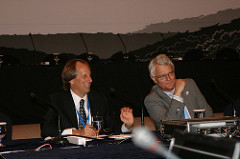During the last public ICANN meeting in San Francisco there was a public forum. This is quite normal.
Several people asked questions of the ICANN board, some were answered, others weren’t.
Why not?
Nigel Roberts from the Channel Isles registry asked the following (for the sake of clarity I’m republishing the entire section of the transcript):
>>NIGEL ROBERTS: Thank you, Peter. My name is Nigel Roberts. I
am with the Channel Islands registry. We run dot gg and dot je.As there is currently an opportunity for the public to provide
input to the U.S. government regarding the IANA contract renewal, I
would like to take this opportunity here in the public forum to ask
what I think is a fundamental question for the record so that I and
others can decide what sort of input to make to the IANA contract
comment period.In Article 4 of the ICANN Articles of Incorporation, ICANN bound
itself to relevant international law. In the case of ICM Registry
against ICANN, the review panel ruled it had legal effect in
California.Now, as the performance of the IANA contract particularly as it
relates to Country Code Top Level Domains, literally, can have effect
in all sovereign nations and dependent territories in the world. I
wonder if you could please confirm something for me.One of the benefits of age is that you lose distance vision.
Excuse me a second.Would you confirm whether or not relevant international law
includes the Universal Declaration of Human Rights of 1949 and/or the
European Convention of Human Rights in 1950 either wholly or
partially? And if the answer is “partially,” which parts are not
relevant?>>PETER DENGATE THRUSH: Nigel, I wonder if you can help me to
start so I can ask the correct people to address this. This is
obviously not an easy one to deal with on the fly.Sorry. What part of the bylaws — what part of Article 4 were you
referring to at the very beginning?>>NIGEL ROBERTS: To be precise, I’m referring to the comments in
ICM Registry against ICANN where it refers to Article 4 stating that
ICANN has bound itself to respect relevant principles of
international law.>>PETER DENGATE THRUSH: All right. I think we are going to have
to spend some time thinking about exactly what you’re asking.>>NIGEL ROBERTS: Happy to take an offline reply in writing.
>>PETER DENGATE THRUSH: Thanks. If we can get back to you before
the end of the public forum, so we can do it here, Nigel, we will.
We are not trying to hide from a very —>>NIGEL ROBERTS: I realize it is not a question you can answer in
three seconds, but it is a question I would like an answer within a
reasonable time, if that’s okay.>>PETER DENGATE THRUSH: Let’s take that under advisement, as
Americans say, and we will come back to you as soon as we can.>>NIGEL ROBERTS: And if it will assist, I will provide the
question in writing.>>PETER DENGATE THRUSH: That would help as well. Thanks.
So did he ever get a reply?
Apparently not. Three months later he’s still waiting for a reply.
I also asked a question in relation to IANA and did get a reply – of sorts.
If ICANN cannot answer questions from its stakeholders and community ie. those of us who go to meetings or have a contract with the Corporation, how can it be expected to “play nice” with the wider world?
Is it any surprise that relations between ICANN and governments are a bit “strained” at times?
Related articles
- Questionable Impact for US Senate Hearing on New gTLDs (circleid.com)
- ICANN Sets June Target for New gTLD Program Launch (circleid.com)

Michele Neylon on answers from ICANN – https://www.internetnews.me/2011/06/12/why-wont-icann-answer-questions/
@mneylon on answers from #ICANN – https://www.internetnews.me/2011/06/12/why-wont-icann-answer-questions/ #domain #tlds
@mneylon on answers from #ICANN – https://www.internetnews.me/2011/06/12/why-wont-icann-answer-questions/ #domain #tlds
RT @nigelrbrts: @mneylon on answers from #ICANN – https://www.internetnews.me/2011/06/12/why-wont-icann-answer-questions/ #domain #tlds
RT @cidomains: Michele Neylon on answers from ICANN – https://www.internetnews.me/2011/06/12/why-wont-icann-answer-questions/